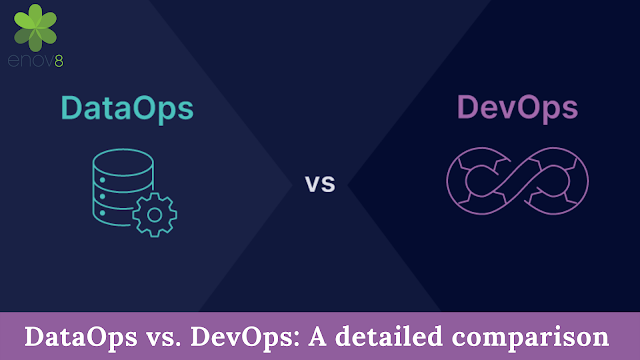DataOps, also known as Data operations, is an enterprise-wide data management technique that streamlines the data flow from the origin to the value. It aims to make the procedure of delivering value from data quicker. Many enterprises are utilising the DataOps technology to streamline the data and cut down the time of advanced analytics.
Data Operations aims to cut down the cost of data management, enhance the data quality and provide quick insights to the analysts and businesses.
DevOps is the technology that companies use to combine development & operations. One can also use this technology to improve team collaboration and quick software delivery.
The companies using DevOps technology can expect improved efficiency, better communication between teams, and faster execution of client feedback.
Data operations and DevOps – both the technologies are based on the agile frameworks that accelerate the working cycles. However, there are many differences as well between these two technologies.
Difference between DataOps and DevOps
In this piece of content, we will see the differences between both these technologies on different parameters:
1. Outcome
The biggest points of difference between these two technologies lie in their outcome. Data Operations is concerned with creating the data streams that can help deliver the data and release the users. The process involves designing apps for sending data and improving the current infrastructure.
If we talk about DevOps, it is more concerned with providing software by utilising rapid deployments and iterative changes led by client feedback. The process is concerned with delivering new products quickly and expanding the functionality.
2. Workflow
Data Operations helps stream data to people who want it to make the necessary decisions. So, the work of the data operations is to deliver the data through the pipeline. It is possible that data sets may change and expand over time, and thus, continuous monitoring of the current infrastructure is also important.
Although DevOps is designed to move swiftly, each stage of the DevOps pipeline is still specified. In DevOps, the
release management process involves planning, scheduling, and controlling the development and delivery process. However, the cooperation is much better here.
3. Testing
In Data Operations, one cannot know about the actual results, and thus, testing is necessary. The data operations may inquire about some questions for the use case and ensure analysts' confidence in the information presented to them.
In DevOps, the testing is straightforward, and the outcomes are defined and expected. One must check whether the application is giving the desired results or not. If you get the desired result, you can move on. One can also rely on
test environment management to improve the software testing cycle.
4. Feedback
Both the technologies play a lot of information to customer feedback, but Data Operations provide more value to the input from the users. The concerned parties pay more attention to processes that generate data & decisions that they will make based on the information received.
If we talk about DevOps, it does not pay much attention to the feedback as they are not meeting the needs.
Conclusion
Finally, we would say that both technologies can help you a lot in your company and accelerate the working cycles. Both have different functionalities, but using them can improve efficiency. However, there exist some differences between them, which are mentioned above; it is important to refer to these points before using the technology.




Comments
Post a Comment